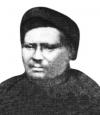Biography
Ishwar Chandra Gupta was an Indian Bengali poet and writer. Gupta was born in the village Kanchanpalli or Kanchrapara, 24 Parganas district (currently in North 24 Parganas district, West Bengal, India).
Early Life
Ishwar Chandra Gupta was brought up in his uncle's house after the death of his mother. Gupta spent most of his childhood in Kolkata. At that time, poets were named Kobiwala and the kobiwalas were not so civilized in language. Sexual words and clashes were common. But Ishwar Chandra Gupta created a different style of poetry.
He started the newspaper Sambad Prabhakar with Jogendra Mohan Tagore on on January 28, 1831. which finally became a daily on June 4, 1839. Many Bengali writers of the 19th century started their career with that magazine. He reintroduced into Bengali poetry the mediaeval style with double meaning (already seen in Sandhyakaranandi and Bharatchandra):
"Ke bole Ishwar Gupta, byapta charachar,
Jahar prabhaye prabha paye Prabhakar.."
'Ishwar' means God, 'Gupta' means hidden and 'Prabhakar' is the sun.So a translation runs:
"Who says God is hidden? He is omnipresent
From Him the Sun gets its luminescence."
Also, Ishwar (Chandra) Gupta ran the journal 'Prabhakar'. So a second meaning of the poem, making a tongue-in-cheek reference to the author, runs:
"Who says Ishwar (Gupta) is hidden? His reach touches the world
For his brilliance makes the Prabhakar luminiscent."
Literary Style
He brought modern era of poetry in Bengali. He did not describe the life of Gods and Goddesses, but the daily life of human beings. He also wrote biographies of many Bengali poets and musicians.
Ishwarchandra Gupta always satires the so called modern class who blindly followed the colonial British power.
"Tumi ma kalpataru
Amra shob posha goru
Shikhi ni shing bankano
Khai kebol khol-bichuli-ghash
Jano ranga amla
Tule mamla
Na bhange gamla
Ma!
Pele bhushi
Tatei kushi
Ghushi khele bachbo na!"
His literary works were included in the curriculum of school level, secondary and higher secondary Bengali Literature in Bangladesh.
Political Views
In the early days he was a conservative, opposing the Young Bengal movement as well as frowning on widow remarriage. His views on widow remarriage put him at odds with Ishwar Chandra Vidyasagar. He was one of the earliest advocates of a Hindu view of Indian society. Later in his life, his views began to change and he championed the cause for the remarriage of virgin widows and women's education.
Ishwar Chandra was a nationalist, with strong feelings for his land and his language. He started a movement for the improvement of Bangla and also made it a point to use Bangla words unaffected by English.
Among his other important contributions are his biographies of Bharatchandra, Ramprasad Sen, Ramnidhi Gupta, Haru Thakur, and other poets. The credit for creating a proper climate for writers such as Bankimchandra Chattopadhyay, Dinabandhu Mitra, Rangalal Banerjee also goes to him.
Works
Apart from Sambad Prabhakar, he also edited a number of other journals including Sangbadratnabali, Pasandapidan, and Sangbadsadhuranjan. He also edited Kalikirtan (1833) and Prabodh Prabhakar (1858) by Ramprasad Sen. Bankimchandra Chattopadhyay edited some of Ishwar Chandra's writings in Ishwar Chandra Guptar Kavita Sanggraha (Collected Poems, 1885) and Satyanarayan Vratakatha (1913). ..






